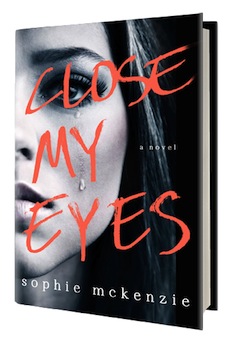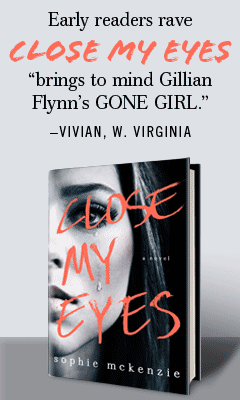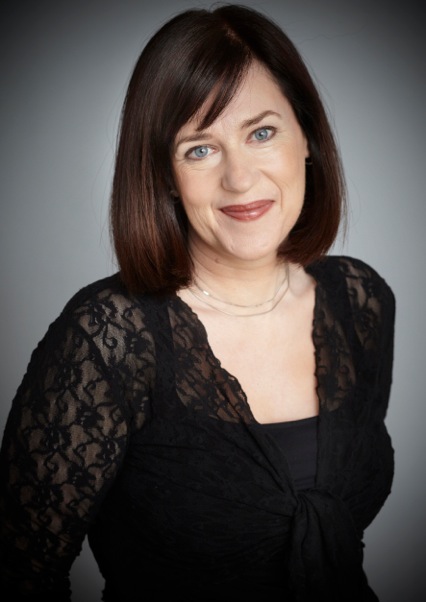Close My Eyes
by Sophie McKenzie
Award-winning author of many books for teens and children in the U.K., Sophie McKenzie makes her U.S. debut with the decidedly adult novel Close My Eyes, a fast-moving tale of psychological suspense full of twists and genuine surprises. While comparisons have been made to Gillian Flynn's Gone Girl, McKenzie's page-turner is more reminiscent of the creepy Gaslight, the 1944 film that so powerfully depicted a terrorized woman it led to the term "gaslighting," a form of mental abuse wherein the victim is made to believe she is going insane. Told from the point of view of a woman whose fragile emotional state and inability to move on from a terrible trauma have rendered her tremendously vulnerable to such cruelty, Close My Eyes quickly draws readers into her world--a place where the lies are so tightly woven that reality itself starts to lose its meaning.
McKenzie's protagonist is Geniver Loxley, a novelist in her late 30s whose career and personal life have settled into a state of permanent, cloudy hold. Eight years earlier, Geniver gave birth to a stillborn child--a daughter she'd named Beth--and is still mourning the loss. Time, therapy and the sympathetic support of her best friend, Hen, have done little to alleviate Gen's depression; she is haunted by vivid dreams of her lost child that seem more real than the fog of her waking hours. While deeply affected as well, Gen's wealthy and successful husband, Art, has been able to move forward emotionally in a way that seems impossible for Gen. Though their previous attempts have been unsuccessful, Art presses a reluctant Gen to try in vitro fertilization one more time. Though she still loves her husband, it is in an abstracted way. Through Gen, McKenzie offers an excellent insight into a marriage where politeness has overtaken passion: "One day I'll talk to Art properly about it," Gen says. "He'll listen, I know he will. He'll want to make it better. Which means he will. I've never known Art to fail at anything."
While contemplating how best to "talk to Art properly" about not wanting to try IVF again, Gen receives an unexpected visitor whose information is so shocking it calls into question everything she knows to be true. The visitor is Lucy O'Donnell, the sister of the nurse who was present at Beth's birth. Lucy claims that not only is Beth alive but that Art was involved in the scheme to give away their baby and convince Gen that she had died in utero. Shocked and deeply shaken, Gen dismisses Lucy as a fortune hunter trying to extract payment for her information. But something about the woman's story--and the possibility that it might be true--lodges in her craw and she can't let it go. What disturbs her even more is Art's outraged reaction and his sudden loss of patience with her questions about the doctor and small private hospital where the baby was delivered. When Gen tries to talk to Hen about Lucy, she receives a similar response. It's all in your head is the message she gets loud and clear. And perhaps, Gen thinks, it is. After all, she has all but switched off her brain for eight years and let herself be swept under by the tidal wave of her grief. And perhaps that grief really has driven her mad.
The only person who seems to believe in Gen's sanity is Lorcan, a shady but appealing ex-friend of Art's who has a troubled past of his own. For reasons that may or may not be altruistic, Lorcan offers to help Gen investigate Lucy's story as well as track down Dr. Rodriguez, Gen's obstetrician, who seems to have vanished without a trace. But although the two traverse London looking for evidence, even Lorcan appears to be mostly humoring her, until Lucy turns up dead--the victim of a hit-and-run suspiciously similar to an accident that befell the anesthesiologist present at Gen's delivery. And although he has reasonable explanations for all of it, Art is beginning to act very strangely, disappearing at odd hours and shredding household documents. Worse, Gen begins to suspect Hen of lying to her as well.
To reveal any more is to spoil the intricate network of twists and turns that McKenzie has expertly woven into the plot. The revelations become more shocking as the novel picks up pace in the second half and even the best guessers won't see the novel's dark final twist coming. McKenzie, however, has created more than just an edge-of-your-seat suspense novel; she has effectively portrayed the psyche of a woman pushed to the brink by both grief and hope. Part of the enjoyment of Close My Eyes is the continuing question of whether or not Gen really has imagined it all--and we with her. It's a chilling and unsettling feeling that pervades this page-turner right up to its last word. --Debra Ginsberg









 The nature of friendship--and the counterpoint between the friendships women have with one another and those they have with men--is an interesting theme in Close My Eyes. What, in your opinion, makes female friendships different from the friendships between women and men or the friendships that men have with one another?
The nature of friendship--and the counterpoint between the friendships women have with one another and those they have with men--is an interesting theme in Close My Eyes. What, in your opinion, makes female friendships different from the friendships between women and men or the friendships that men have with one another?